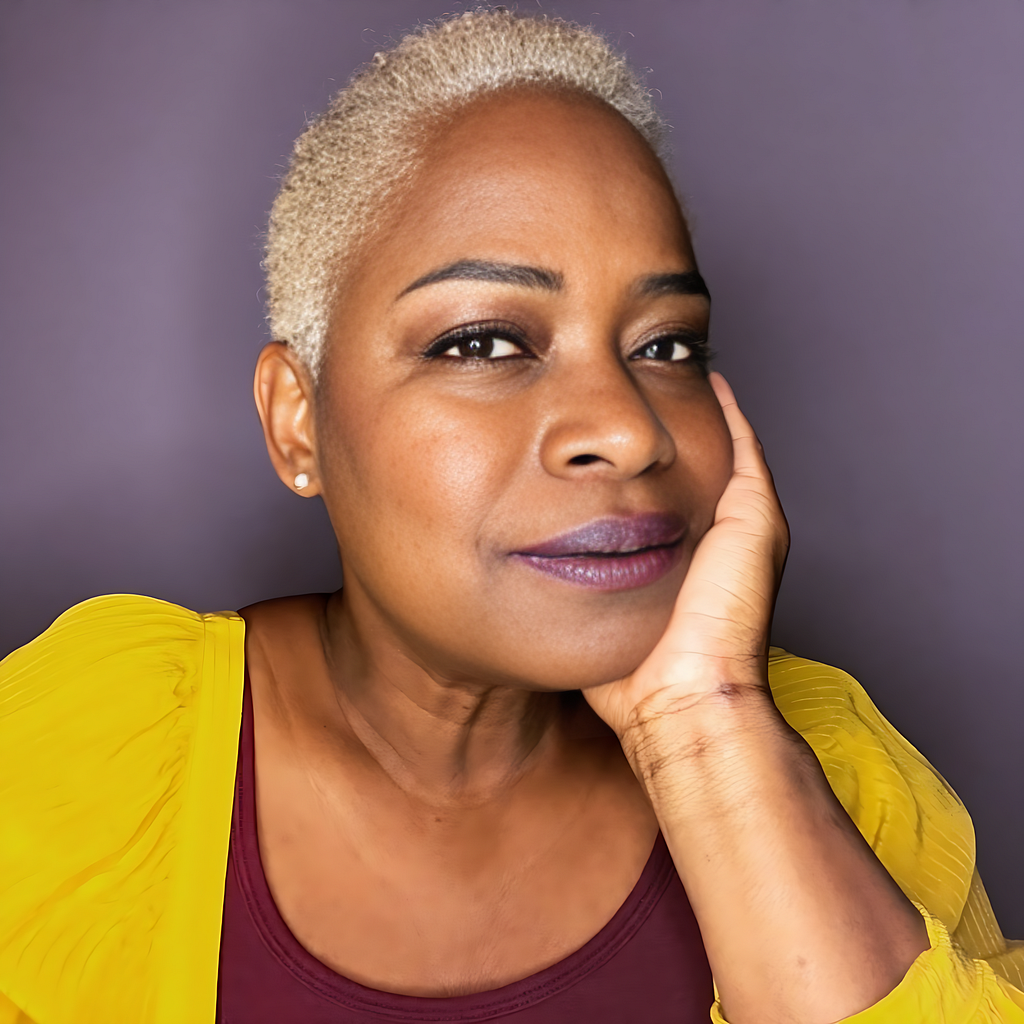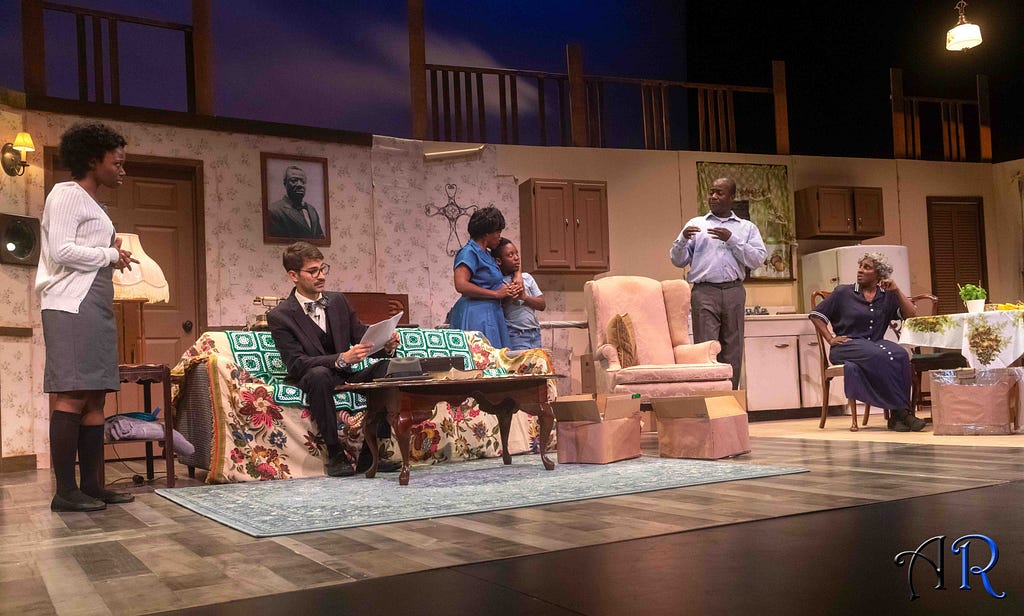
Embrace Adaptability: I’ve learned that the ability to adapt to unexpected changes is a vital skill in the arts. Instead of fearing mistakes, they often lead to the most memorable moments in performance.
As part of my series about “Individuals and organizations making an important social impact”, I had the pleasure of interviewing Michelle Banks.
Michelle Banks is the Founder and Artistic Director of Visionaries of The Creative Arts. Michelle is an accomplished artist hailing from Washington, DC, excelling in various creative roles such as acting, writing, directing, and producing. She has made notable television appearances and starred in critically acclaimed films. As a writer, she co-authored plays and performed her original one-woman show, “REFLECTIONS OF A BLACK DEAF WOMAN,” which received widespread acclaim. She holds a Master’s degree in Organizational Management and currently serves as the Artistic Director of Visionaries of the Creative Arts (VOCA) in Washington, DC which she founded in 2019.
Thank you so much for joining us in this interview series! Can you tell us a story about what brought you to this specific career path?
From a young age, I was drawn to the arts. I realized the immense power of storytelling, not just for entertainment but for creating connections and changing perspectives. This realization motivated me to pursue a career in the arts, particularly acting and later, directing. It was a deep passion for both artistic expression and the belief in the power of the Deaf community that led me to co-found Visionaries of the Creative Arts (VOCA). I saw a need for more opportunities and representation for Deaf and Hard-of-Hearing BIPOC artists, and this fueled my journey into this specific career path.
Can you share the most interesting story that happened to you since you began leading your company or organization?
One of the most interesting and rewarding moments since co-founding VOCA was when the pandemic hit us in 2020 and everything changed in a heartbeat. Before the entire country was shut down, VOCA was preparing its first production, A Raisin in the Sun by Lorraine Hansberry, to be present at the Black Box Theater in Silver Spring, MD in April 2020. We knew we did not want to sit down around and do nothing during the early pandemic. So, VOCA collaborated with the United Deaf Unity Ministries to present our first virtual performance, along with a panel discussion. We produced a performance video of “We Wear the Mask” by Paul L. Dunbar with a nationwide group of remarkably talented Deaf and Hard of Hearing Black performers. In the video, they signed the poem in American Sign Language (ASL), danced, and created body movements to convey its meaning. We also had hearing performers voice-interpreted for the Deaf and Hearing of Hearing performers. On the day of the virtual showing and the panel discussion, we drew over 25,000 viewers.
It has been said that our mistakes can be our greatest teachers. Can you share a story about the funniest mistake you made when you were first starting? Can you tell us what lesson you learned from that?
In the early days of my career, I made an unintentionally hilarious mistake when I would jump into things without any well-thought-out plans. Things would have gone awry and then, there would be no success. I’ve learned a great lesson to take a step back and assess the situation first before getting into details and planning.
Can you describe how you or your organization is making a significant social impact? VOCA is making a substantial social impact by breaking down barriers for Deaf and Hard-of-Hearing BIPOC artists. We provide a platform where these artists can express themselves and be seen and heard. Our performances, like “ISM II,” transcend traditional boundaries of sound and language, fostering inclusivity and bringing together Deaf and hearing audiences. By advocating for underrepresented voices, we contribute to a more equitable and diverse cultural landscape
The Deaf/HoH BIPOC community and its artists have been historically overlooked and underrepresented in mainstream and Deaf culture, a form of social injustice that VOCA stands to redress. Deaf BIPOC artists have not been provided equal access to avenues that would enhance their talents and advance their entertainment careers due to limited resources and opportunities. Since its inception in July 2019, VOCA has responded to this critical need by actively supporting and showcasing the creative work of Deaf and Hard-of-Hearing BlPOC artists by providing training, job opportunities, theater venues and a lab to develop or showcase their work. VOCA also has hosted panels to discuss tips with other BIPOC Deaf artists on improving their visibility in the arts scene. Before VOCA, the landscape of Deaf theater had been traditionally white Deaf led and did not center BIPOC Deaf artists. VOCA is poised to invoke a paradigm shift and add this missing perspective and artistic expression within the artistic Deaf community. VOCA’s mission, to provide resources to promote Deaf BIPOC-created and produced art, is unlike any other performing arts organization. Our organization increases awareness and benefits the American artistic mosaic by sharing the valuable cultural creations of people who are Deaf Black Indigenous and People of Color.
Can you tell us a story about a particular individual who was impacted or helped by your cause?
VOCA has been making a significant impact on many people and youth through our initiatives. However, there was a young Black Deaf girl who attended our summer camp and she was so excited to participate in the summer program to learn all about the arts. Being in the camp had helped her open up and be more confident about her individuality. She mentioned this was her best summer camp ever. Because of my strong influence in the arts, she wants to become an actress and a director like me.
Are there three things the community/society/politicians can do to help you address the root of the problem you are trying to solve?
1. Promote Inclusivity: Promote policies and initiatives that encourage diversity and inclusivity in the arts. This includes ensuring that the Deaf and Hard-of-Hearing BIPOC community has equal opportunities and representation.
2. Invest in Arts Education: Support accessible and quality arts education for Deaf and Hard-of-Hearing individuals. This empowers them with the skills and knowledge to pursue careers in the arts.
3. Foster Collaboration: Encourage collaboration between the Deaf, Hard-of-Hearing, and hearing communities in the arts. This collaboration can lead to groundbreaking productions and experiences that bridge the gap between different worlds.
These steps can help us address the root challenges and create a more inclusive arts and cultural landscape.
How do you define “Leadership”? Can you explain what you mean or give an example? Leadership, to me, is about inspiring others to achieve their full potential and encouraging positive change. It’s not just about being in charge but guiding others towards a shared vision. An example of leadership within VOCA is how we empower our Deaf and Hard-of-Hearing artists to become leaders themselves, not just in the arts but as advocates for their community. True leadership is about fostering growth and making a difference.

What are your “5 things I wish someone told me when I first started” and why. Please share a story or example for each.
1. The Power of Perseverance: When I began, I wish someone had emphasized that success in the arts often comes from persistence. There were moments of rejection and self-doubt, but I learned that consistent effort leads to growth.
2. The Importance of Collaboration: I’ve come to appreciate the value of collaboration. In the early days, I didn’t fully understand how working with a diverse team could enhance creativity and impact. It was through collaborative experiences that I saw the magic that happens when different perspectives come together.
3. Embrace Adaptability: I’ve learned that the ability to adapt to unexpected changes is a vital skill in the arts. Instead of fearing mistakes, they often lead to the most memorable moments in performance.
4. Find Your Voice: Finding my unique voice and message took time. I wish I had been encouraged to embrace my individuality from the start, as it’s a powerful tool for connecting with audiences.
5. Impact Beyond the Art: From early on, I wish someone had emphasized that art has the potential to create significant social change. My career is not just about entertainment but also advocacy and empowerment.
You are a person of enormous influence. If you could inspire a movement that would bring the most amount of good to the most amount of people, what would that be? You never know what your idea can trigger. 🙂
If I could inspire a movement, it would be to ensure we from all walks of life come together as one community and significantly contribute to social change by bringing peace, love, and understanding to the world.
Can you please give us your favorite “Life Lesson Quote”? Can you share how that was relevant to you in your life?
“Don’t let anyone tell you what you can’t do, but only you can tell yourself what you can do!” I don’t allow anyone to dictate what I can do or can’t do, only I can make that decision about what I can do and want to do in life.
Is there a person in the world, or in the US with whom you would like to have a private breakfast or lunch with, and why? He or she might just see this, especially if we tag them.
I’d love to have lunch with Michelle Obama because she has inspired millions of people, especially women of color, with her dignity, grace, intelligence, and humility. She has helped us recognize our worth through her writings and speeches. I admire her character, strength, and wisdom. Her presence has instilled in me to be more appreciative of little things in life. I’d love to chat with her and pick her brain about life.
How can our readers further follow your work online?
This was very meaningful, thank you so much. We wish you only continued success in your great work!
Social Impact Heroes: Why & How Michelle Banks Is Helping To Change Our World was originally published in Authority Magazine on Medium, where people are continuing the conversation by highlighting and responding to this story.
